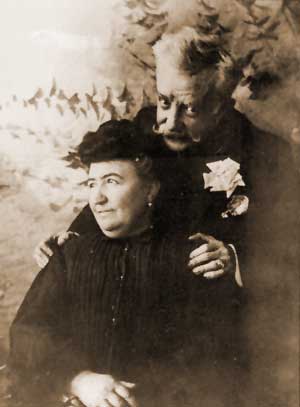 |
El bateo |
|
This material is © Christopher Webber, Blackheath, London, UK. Last updated December 12th 2001 |
|
El bateo ('The baptism'), premiered on 7th November 1901 at the Teatro de la Zarzuela, was the last of Chueca's great successes. The theatre is significant - for the first time Madrid's most truly popular musical hero had been invited to provide a género chico piece for the respectable home of three-act zarzuela. His librettists, the experienced Paso and talented newcomer Domínguez, provided the composer with a vivid, naturalistic slice of life, not without some satirical thrusts at extremist politics and middle-class 'foreign' fads, but in all essentials an optimistic little farce about ordinary people's capacity to forgive and forget. |
|
Chueca's score delighted the discerning patrons of the Teatro de la Zarzuela. Once again, it effectively takes the form of a popular dance suite, with its catchy seguidillas, tango, habanera and the rest - many of them quoted in the rhythmically brilliant and popular Preludio - and there is even a mini suite-within-a-suite in the potpourri of the organ-grinders, who play a mazurka and vals before finishing with a "new" pasodoble incorporating quotations from popular scores by Gímenez and Chueca himself. As an enthusiastic amateur of the art, the composer must have relished the opportunity to provide music for the hilarious photography scene, and altogether El bateo is one of his happiest inspirations.
![]() Scene 1 - A
street in the poor suburbs of Madrid. After the Preludio, we see
guests arriving for a celebration hosted by Señora Valeriana. They join
in a spontaneous Seguidillas: "No quiere el Municipio regar",
after which the droll republican Wamba entertains the crowd with his guitar
playing and a zany satirical Tango about the political state of the nation,
full of extremist factions warring at the expense of ordinary people - what it
surely needs is a new Robespiere to sort matters out (Tango: "El día menos pensado pasa un
barbaridad".)
Scene 1 - A
street in the poor suburbs of Madrid. After the Preludio, we see
guests arriving for a celebration hosted by Señora Valeriana. They join
in a spontaneous Seguidillas: "No quiere el Municipio regar",
after which the droll republican Wamba entertains the crowd with his guitar
playing and a zany satirical Tango about the political state of the nation,
full of extremist factions warring at the expense of ordinary people - what it
surely needs is a new Robespiere to sort matters out (Tango: "El día menos pensado pasa un
barbaridad".)
The reason for the gathering is the baptism of the natural child of Valeriana's daughter Nieves. The father, Lolo, has honourable intentions towards his girlfriend, and the atheistic Wamba is to be the unwilling godfather. Trouble is brewing through the interference of an old sweetheart of Nieves, Don Tancredo Pamplinas, who believes he has proof that Nieves has been receiving visits at night from a strange man. A skittish neighbour, Visita, confirms that she has seen a man climbing in over Nieves' balcony, as does her well-heeled, doting admirer, Virginio. This ill-assorted pair sing a substantial duet, in which Visita's duplicitous greed is fully matched by her lover's foolishness (Dúo-habanera: "Yo me llamo Virginio Lechuga".)
Visita breaks the news of the rumours to Lolo, who is torn between jealous fury and disbelief. A major row with Nieves ensues, though Wamba - sure that the misunderstanding will be sorted out - eventually calms things down. At his suggestion everyone agrees at least to move off to the church of San Antonio de la Florida to get the baptism over and done with, whether or not the marriage is to follow. A crowd of cheeky street urchins joins the crowd as the party marches off to the church (Coro: "Bateo pelao".)
|
|
|
![]() Scene 4 -
Don Pascual's restaurant near the church. A frenchified photographer
struggles to pose the family group, disrupting the luncheon service in the
process (Polka: "¡Qué grupo más
bonito!".) In the absence of the organ-grinders, a group of serious
musicians try to play an old-fashioned French minuet for the guests to dance
to, with predictably ludicrous results as everyone tries to converse in French
and even English (Gavota: "Pianísimo ese re").
Scene 4 -
Don Pascual's restaurant near the church. A frenchified photographer
struggles to pose the family group, disrupting the luncheon service in the
process (Polka: "¡Qué grupo más
bonito!".) In the absence of the organ-grinders, a group of serious
musicians try to play an old-fashioned French minuet for the guests to dance
to, with predictably ludicrous results as everyone tries to converse in French
and even English (Gavota: "Pianísimo ese re").
Before the celebratory lunch can be served, the row breaks out again. Pamplinas's motives were mixed, but he genuinely does not want Lolo to take responsibility for a child that is not his, and all are stunned by the presumed infidelity of Nieves. At last the truth comes out. Wamba was the man seen climbing in through the balcony, visiting not Nieves, but her mother Valeriana! Amicable relations are restored all round, and the baptism meal is finally served by Don Pascual as the curtain falls to a final reminder of the organ-grinders' mazurka from the orchestra.

